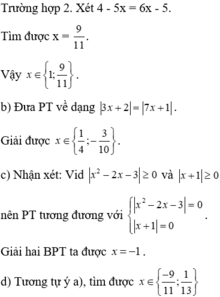
Hãy nhập câu hỏi của bạn vào đây, nếu là tài khoản VIP, bạn sẽ được ưu tiên trả lời.


2x^4-9x^3+14x^2-9x+2=0
vế trái có tổng các hệ số (2-9+14-9+2)=0 nến có 1 nghiêm x=1
nên phân tích đc nhân tử là (x-1)
2x^4-9x^3+14x^2-9x+2=0 <=> (x-1)(2x^3-7x^2+7x-2)=0
<=> x=1 và 2x^3-7x^2+7x-2=0
PT: 2x^3-7x^2+7x-2=0 cũng có tổng các hệ số (2-7+7-2)=0 nên cũng có 1 nghiệm là 1 => vế trái có thể phân tích đc nhân tử (x-1)
2x^3-7x^2+7x-2=0 <=> (x-1)(2x^2-5x+2)=0
<=> x=1 và 2x^2-5x+2=0
2x^2-5x+2=0 <=> x^2 - (5/2)x + 1 =0
<=> (x-5/4)^2 - 9/16 = 0
<=> (x-5/4)^2 - (3/4)^2 = 0

\(\Leftrightarrow5\left(x^4+2x^2+1\right)+2\left(y^6+2y^3+1\right)=13\)
\(\Leftrightarrow5\left(x^2+1\right)^2+2\left(y^3+1\right)^2=13\)
\(\Leftrightarrow\left(x^2+1\right)^2=\dfrac{13-2\left(y^3+1\right)^2}{5}\le\dfrac{13}{5}< 4\)
\(\Rightarrow x^2+1< 2\Rightarrow x^2< 1\)
\(\Leftrightarrow x=0\)
\(\Rightarrow y^6+2y^3-3=0\Rightarrow\left[{}\begin{matrix}y^3=1\Rightarrow y=1\\y^3=-3\left(ktm\right)\end{matrix}\right.\)
Vậy \(\left(x;y\right)=\left(0;1\right)\)

\(b,\)\(\frac{x+1}{2008}+\frac{x+2}{2007}+\frac{x+3}{2006}=\frac{x+4}{2005}+\frac{x+5}{2004}+\frac{x+6}{2003}\)
\(\Rightarrow\left(\frac{x+1}{2008}+1\right)+\left(\frac{x+2}{2007}+1\right)+\left(\frac{x+3}{2006}+1\right)=\left(\frac{x+4}{2005}+1\right)+\left(\frac{x+5}{2004}+1\right)+\left(\frac{x+6}{2003}+1\right)\)
\(\Rightarrow\frac{x+2009}{2008}+\frac{x+2009}{2007}+\frac{x+2009}{2006}=\frac{x+2009}{2005}+\frac{x+2009}{2004}+\frac{x+2009}{2003}\)
\(\Rightarrow\left(x+9\right)\left(\frac{1}{2008}+\frac{1}{2007}+\frac{1}{2006}\right)=\left(x+9\right)\left(\frac{1}{2005}+\frac{1}{2004}+\frac{1}{2003}\right)\)
\(\Rightarrow\frac{1}{2008}+\frac{1}{2007}+\frac{1}{2006}=\frac{1}{2005}+\frac{1}{2004}+\frac{1}{2003}\left(KTM\right)\)
\(\text{Giải}\)
\(b,\frac{x+1}{2008}+\frac{x+2}{2007}+\frac{x+3}{2006}=\frac{x+4}{2005}+\frac{x+5}{2004}+\frac{x+6}{2003}\)
\(\Leftrightarrow\left(x+2009\right)\left(\frac{1}{2008}+\frac{1}{2007}+\frac{1}{2006}-\frac{1}{2005}-\frac{1}{2004}-\frac{1}{2003}\right)=0\)
\(\Leftrightarrow x+2009=0\Leftrightarrow x=-2009\)



1, 2mx−1x−1=m−2 (x≠1)(x≠1)
⇔ 2mx−1=(m−2)(x−1)
⇔ 2mx−1=x(m−2)−m+2
⇔ x.(m+2)=−m+3x.(m+2)=−m+3
Nếu m+2=0m+2=0 hay m=−2m=−2 thì 0x=5
⇒ PT vô nghiệm
Nếu m+2≠0 hay m≠−2 thì x=3mm+2
2, 2x2x²−5x+3+9x2x²−x−3=6
⇔ 2x(3x−2).(x−1)+9x(3x−2).(x+1)=6
⇔ 2x(x+1)(3x−2).(x−1)(x+1)+9x(x−1)(3x−2).(x+1)(x−1)=6
⇒ 2x(x+1)+9x(x−1)=6(3x−2)(x+1)(x−1)
⇔ 11x²−7x=18x³−12x²−18x+12
⇔ 18x³−13x²−11x+12=0

a) \(\frac{x+1}{4}-\frac{x+2}{5}+\frac{x+4}{7}-\frac{x+5}{8}+\frac{x+7}{10}-\frac{x+9}{12}=0\)
\(\Leftrightarrow\)\(\frac{x+1}{4}-1-\frac{x+2}{5}+1+\frac{x+4}{7}-1-\frac{x+5}{8}+1+\frac{x+7}{10}-1-\frac{x+9}{12}+1=0\)
\(\Leftrightarrow\)\(\frac{x-3}{4}-\frac{3-x}{5}+\frac{x-3}{7}-\frac{3-x}{8}+\frac{x+3}{10}-\frac{3-x}{12}=0\)
\(\Leftrightarrow\)\(\frac{x-3}{4}+\frac{x-3}{5}+\frac{x-3}{7}+\frac{x-3}{8}+\frac{x-3}{10}+\frac{x-3}{12}=0\)
\(\Leftrightarrow\)\(\left(x-3\right)\left(\frac{1}{4}+\frac{1}{5}+\frac{1}{7}+\frac{1}{8}+\frac{1}{10}+\frac{1}{12}\right)=0\)
Vì \(\frac{1}{4}+\frac{1}{5}+\frac{1}{7}+\frac{1}{8}+\frac{1}{10}+\frac{1}{12}\ne0\)
\(\Rightarrow\)\(x-3=0\)
\(\Leftrightarrow\)\(x=3\)
Vậy...
b) \(\frac{x}{2004}+\frac{x+1}{2005}+\frac{x+2}{2006}+\frac{x+3}{2007}=4\)
\(\Leftrightarrow\)\(\frac{x}{2004}-1+\frac{x+1}{2005}-1+\frac{x+2}{2006}-1+\frac{x+3}{2007}-1=0\)
\(\Leftrightarrow\)\(\frac{x-2004}{2004}+\frac{x-2004}{2005}+\frac{x-2004}{2006}+\frac{x-2004}{2007}=0\)
\(\Leftrightarrow\)\(\left(x-2004\right)\left(\frac{1}{2004}+\frac{1}{2005}+\frac{1}{2006}+\frac{1}{2007}\right)=0\)
Vì \(\frac{1}{2004}+\frac{1}{2005}+\frac{1}{2006}+\frac{1}{2007}\ne0\)
\(\Rightarrow\)\(x-2004=0\)
\(\Leftrightarrow\)\(x=2004\)
Vậy...

a) Ta có: \(x^2+\dfrac{9x^2}{\left(x+3\right)^2}=40\)
\(\Leftrightarrow\dfrac{\left(x^2+3x\right)^2+9x^2}{\left(x+3\right)^2}=40\)
\(\Leftrightarrow x^4+6x^3+9x^2+9x^2=40\left(x+3\right)^2\)
\(\Leftrightarrow x^4+6x^3+18x^2=40\left(x^2+6x+9\right)\)
\(\Leftrightarrow x^4+6x^3+18x^2-40x^2-240x-360=0\)
\(\Leftrightarrow x^4+6x^3-22x^2-240x-360=0\)
\(\Leftrightarrow x^4+2x^3+4x^3+8x^2-30x^2-60x-180x-360=0\)
\(\Leftrightarrow x^3\left(x+2\right)+4x^2\left(x+2\right)-30x\left(x+2\right)-180\left(x+2\right)=0\)
\(\Leftrightarrow\left(x+2\right)\left(x^3+4x^2-30x-180\right)=0\)
\(\Leftrightarrow\left(x+2\right)\left(x^3-6x^2+10x^2-60x+30x-180\right)=0\)
\(\Leftrightarrow\left(x+2\right)\left[x^2\left(x-6\right)+10x\left(x-6\right)+30\left(x-6\right)\right]=0\)
\(\Leftrightarrow\left(x+2\right)\cdot\left(x-6\right)\left(x^2+10x+30\right)=0\)
mà \(x^2+10x+30>0\forall x\)
nên \(\left(x+2\right)\left(x-6\right)=0\)
\(\Leftrightarrow\left[{}\begin{matrix}x+2=0\\x-6=0\end{matrix}\right.\Leftrightarrow\left[{}\begin{matrix}x=-2\\x=6\end{matrix}\right.\)
Vậy: S={-2;6}
b) Ta có: (m-1)x+3m-2=0
\(\Leftrightarrow\left(m-1\right)x=2-3m\)
\(\Leftrightarrow x=\dfrac{2-3m}{m-1}\)
Để phương trình có nghiệm duy nhất thỏa mãn \(x\ge1\) thì \(\dfrac{2-3m}{m-1}\ge1\)
\(\Leftrightarrow\dfrac{2-3m}{m-1}-1\ge0\)
\(\Leftrightarrow\dfrac{2-3m-\left(m-1\right)}{m-1}\ge0\)
\(\Leftrightarrow\dfrac{2-3m-m+1}{m-1}\ge0\)
\(\Leftrightarrow\dfrac{-4m+3}{m-1}\ge0\)
hay \(\dfrac{3}{4}\le m< 1\)
Vậy: Để phương trình (m-1)x+3m-2=0 có nghiệm duy nhất thỏa mãn \(x\ge1\) thì \(\dfrac{3}{4}\le m< 1\)

\(x^{2007}-9x^{2005}+5x^2-14x-3=0\)
\(\Leftrightarrow x^{2005}(x^{2}-9)+5x^{2}-15x+x-3=0\)
\(\Leftrightarrow x^{2005}(x-3)(x+3)+5x(x-3)+x-3=0\)
\(\Leftrightarrow (x^{2006}+3x^{2005}+5x+1)(x-3)=0\)
Xét đa thức : \(P(x)=x^{2006}+3x^{2005}+5x+1\)
\(P(x)<0\) với \(x \in \{-1;-2;-3 \}\)
\(P(x)>0\) với \(x \ge 0\) hoặc \(x \le -4\)
Vậy \(P(x) \ne 0\) \(\forall x\inℤ\)nên x = 3